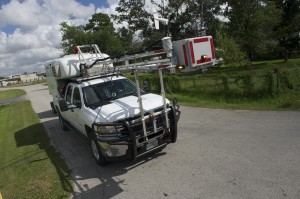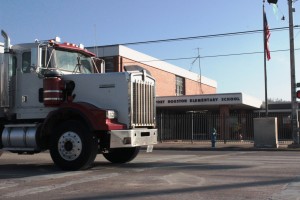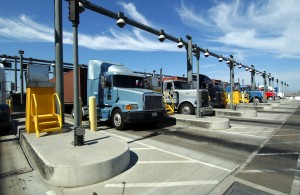Tracing Traffic Pollution as Texas Port Expands

Courtesy Rice University
A pickup truck equipped to detect pollution is a project of Rice University and the University of Houston
At Rice University in Houston, environmental engineer Rob Griffin is working on a project that uses a pollution detection device as big as a pickup truck. Actually, it is a pickup truck.
The mobile pollution lab has been roaming the streets and highways of Houston since this fall. The project won’t be done for at least another year.
“We are going to have a lot of data. This is going to be an incredibly massive project,” Griffin told StateImpact.
In particular, his team hopes to learn about particulates: the microscopic fine particulate matter that can come from power plants that burn coal or trucks that run on diesel fuel.
A Lack of Data on Tiny Particles

Dave Fehling / StateImpact
Rob Griffin is an environmental engineer at Rice University
Particulate matter has received increased attention from researchers who link it to cancer. The U.S. Environmental Protection Agency ranks some regions like Los Angeles as having too much of it in their air.
The EPA is tightening allowable limits and Houston is right on the cusp of being listed “non-attainment” says Griffin. But he adds there’s a problem with existing data used by regulators.
“There are areas in Houston where we don’t know what the particulate matter level is at all.” The pickup-mounted pollution detector could provide far more detailed data.
“What we’ve added is the capability of measuring how many particles are in the air, how big they are, and what they’re chemically made of.”
A Bigger Port of Houston Could Mean More Diesel Pollution
That data may become more critical to Houston and Texas because they soon be dealing with far more diesel trucks on their roads. The reason: container ships that once unloaded on the West Coast soon will be able to sail through the widened Panama Canal, reaching ports along the Gulf Coast.

Dave Fehling / StateImpact
A diesel truck passes a school near the Port of Houston
The Port of Houston — already one of the busiest in the nation —- is spending billions to accommodate what could be significantly more and bigger ships and millions of tons of container cargo.
Much of that container cargo is expected to be hauled away by truck. Already, several thousand trucks a day make trips through the Port and the expansion could mean many more.
Which is why some people think Texas should look to California for ways to reduce truck pollution.
“They’re probably about a decade ahead of us in terms of what they’re doing,” said Adrian Shelley, the executive director of the group, Air Alliance Houston. He was among a group of community activists who recently toured the Port of Los Angeles.
What Los Angeles Did
Over a decade ago, Los Angeles found that increased container cargo at its port was great for the economy but bad for the air.
“What was happening in the early 2000s was the port was growing at a double digit pace, year in, year out. It got to the point there was a lot of pollution around here. And there were health studies showing diesel particulate matter was a cancer-causing agent,” said Phillip Sanfield, a spokesman for the Port of Los Angeles.”Many of the environmental groups here in Southern California said to us, enough is enough.”

Courtesy Port of Los Angeles
Trucks entering the Port of Los Angeles
A big culprit was old trucks: diesel engines prior to 2008 lacked pollution control equipment. So the city created a “clean air action plan” that paid truck owners to replace older, dirtier-running trucks.
“Essentially what’s happened is we’ve turned over the fleet here in about four years. We went from 16,000 dirty trucks to about 10,000 clean trucks,” Sanfield told StateImpact.
Is Houston Different?
But will such a program be needed in Texas? The Texas Trucking Association contends that the situation Houston might face would be different than what Los Angeles dealt with years ago.
“That problem is going away,” said John Esparza, the truck group’s president. “If you take a good hard look at what’s operating in and out of the (Houston) port, what you are going to see is the majority of those trucks are 2008 and newer engines.”
Esparza said the focus should now be on those pre-2008 trucks. Texas already has a program somewhat similar to California’s called Drive a Clean Machine.
“The state offers a program that puts money into the pockets of those individuals who are willing to change or retrofit their trucks with these newer engines. That’s what we really have to focus on: getting the remainder of those trucks out there up to newer standards.”